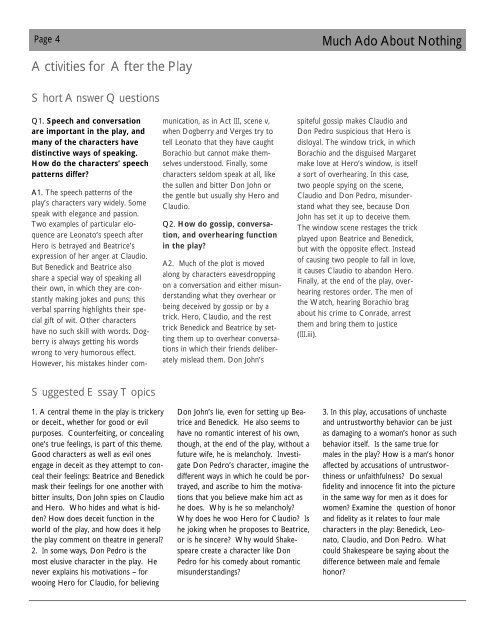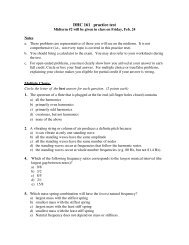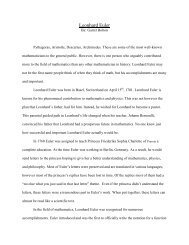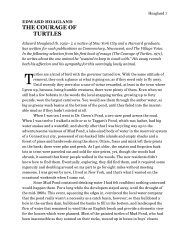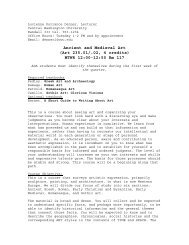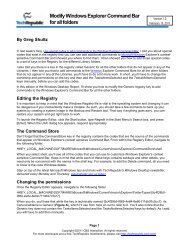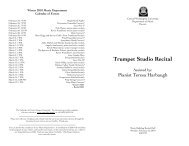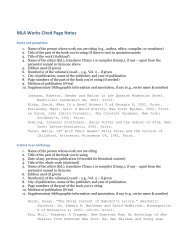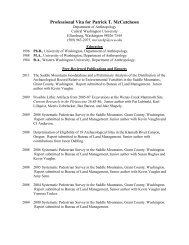Central Theatre Ensemble Presents . . . Much Ado About Nothing
Central Theatre Ensemble Presents . . . Much Ado About Nothing
Central Theatre Ensemble Presents . . . Much Ado About Nothing
Create successful ePaper yourself
Turn your PDF publications into a flip-book with our unique Google optimized e-Paper software.
Page 4 <strong>Much</strong> <strong>Ado</strong> <strong>About</strong> <strong>Nothing</strong><br />
Activities for After the Play<br />
Short Answer Questions<br />
Q1. Speech and conversation<br />
are important in the play, and<br />
many of the characters have<br />
distinctive ways of speaking.<br />
How do the characters’ speech<br />
patterns differ?<br />
A1. The speech patterns of the<br />
play’s characters vary widely. Some<br />
speak with elegance and passion.<br />
Two examples of particular eloquence<br />
are Leonato’s speech after<br />
Hero is betrayed and Beatrice’s<br />
expression of her anger at Claudio.<br />
But Benedick and Beatrice also<br />
share a special way of speaking all<br />
their own, in which they are constantly<br />
making jokes and puns; this<br />
verbal sparring highlights their special<br />
gift of wit. Other characters<br />
have no such skill with words. Dogberry<br />
is always getting his words<br />
wrong to very humorous effect.<br />
However, his mistakes hinder com-<br />
Suggested Essay Topics<br />
1. A central theme in the play is trickery<br />
or deceit., whether for good or evil<br />
purposes. Counterfeiting, or concealing<br />
one’s true feelings, is part of this theme.<br />
Good characters as well as evil ones<br />
engage in deceit as they attempt to conceal<br />
their feelings: Beatrice and Benedick<br />
mask their feelings for one another with<br />
bitter insults, Don John spies on Claudio<br />
and Hero. Who hides and what is hidden?<br />
How does deceit function in the<br />
world of the play, and how does it help<br />
the play comment on theatre in general?<br />
2. In some ways, Don Pedro is the<br />
most elusive character in the play. He<br />
never explains his motivations – for<br />
wooing Hero for Claudio, for believing<br />
munication, as in Act III, scene v,<br />
when Dogberry and Verges try to<br />
tell Leonato that they have caught<br />
Borachio but cannot make themselves<br />
understood. Finally, some<br />
characters seldom speak at all, like<br />
the sullen and bitter Don John or<br />
the gentle but usually shy Hero and<br />
Claudio.<br />
Q2. How do gossip, conversation,<br />
and overhearing function<br />
in the play?<br />
A2. <strong>Much</strong> of the plot is moved<br />
along by characters eavesdropping<br />
on a conversation and either misunderstanding<br />
what they overhear or<br />
being deceived by gossip or by a<br />
trick. Hero, Claudio, and the rest<br />
trick Benedick and Beatrice by setting<br />
them up to overhear conversations<br />
in which their friends deliberately<br />
mislead them. Don John’s<br />
Don John’s lie, even for setting up Beatrice<br />
and Benedick. He also seems to<br />
have no romantic interest of his own,<br />
though, at the end of the play, without a<br />
future wife, he is melancholy. Investigate<br />
Don Pedro’s character, imagine the<br />
different ways in which he could be portrayed,<br />
and ascribe to him the motivations<br />
that you believe make him act as<br />
he does. Why is he so melancholy?<br />
Why does he woo Hero for Claudio? Is<br />
he joking when he proposes to Beatrice,<br />
or is he sincere? Why would Shakespeare<br />
create a character like Don<br />
Pedro for his comedy about romantic<br />
misunderstandings?<br />
spiteful gossip makes Claudio and<br />
Don Pedro suspicious that Hero is<br />
disloyal. The window trick, in which<br />
Borachio and the disguised Margaret<br />
make love at Hero’s window, is itself<br />
a sort of overhearing. In this case,<br />
two people spying on the scene,<br />
Claudio and Don Pedro, misunderstand<br />
what they see, because Don<br />
John has set it up to deceive them.<br />
The window scene restages the trick<br />
played upon Beatrice and Benedick,<br />
but with the opposite effect. Instead<br />
of causing two people to fall in love,<br />
it causes Claudio to abandon Hero.<br />
Finally, at the end of the play, overhearing<br />
restores order. The men of<br />
the Watch, hearing Borachio brag<br />
about his crime to Conrade, arrest<br />
them and bring them to justice<br />
(III.iii).<br />
3. In this play, accusations of unchaste<br />
and untrustworthy behavior can be just<br />
as damaging to a woman’s honor as such<br />
behavior itself. Is the same true for<br />
males in the play? How is a man’s honor<br />
affected by accusations of untrustworthiness<br />
or unfaithfulness? Do sexual<br />
fidelity and innocence fit into the picture<br />
in the same way for men as it does for<br />
women? Examine the question of honor<br />
and fidelity as it relates to four male<br />
characters in the play: Benedick, Leonato,<br />
Claudio, and Don Pedro. What<br />
could Shakespeare be saying about the<br />
difference between male and female<br />
honor?


